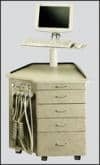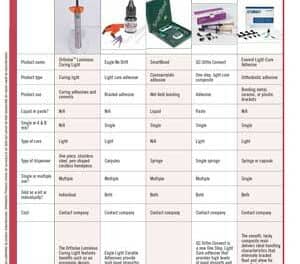by Brett Blake
 |
Like many of you, I have been consuming economic news and commentary from dozens of sources to make decisions about my financial portfolio. In all of my reading, nothing has struck me with more force than a three-word paragraph in the October 13, 2008, issue of Fortune magazine. In a biographical introduction to former AIG CEO Maurice R. (Hank) Greenberg, I read three words that summed up today’s real economic issue. The words: “Until they didn’t.”
According to Fortune, AIG was one of many companies that started providing insurance to lenders that covered credit losses. AIG’s executives thought they understood the risk they were taking. “No matter what historical default scenario was plugged in, the hazards were small. Generations of data didn’t lie—American homeowners paid their mortgages.”
“Until they didn’t.”
I read those words and thought of all the orthodontists who have told me, “We don’t check our patients’ credit reports, and we’ve never had a problem.” If my clients are representative of the broader industry, more than 75% of all orthodontic treatment is paid for using in-house financing. Orthodontists are effectively bankers that I estimate are lending more than $5 billion per year—blindly.
If the Fortune writer is accurate in his statement, something has happened that has changed the financial markets significantly. It may be behavioral: Our generation didn’t inherit the same personal commitment to paying our debt. It may be financial: The economy has affected so many people in ways previous economic downturns have not. It may simply be a result of the huge increase in the availability of credit.
Whatever the cause, for the first time in recorded history, Americans are not paying their mortgages. If they will default on their homes, what other obligations will they walk away from?
In orthodontics, the few who are not willing or able to make their payments are only part of the financial pressures practices are feeling. Case starts are down in many practices as a result of the economy and due to the significant increase in the number of GPs now offering orthodontic treatments.
Today’s economic environment, therefore, has given orthodontists two challenges to respond to: 1) GPs may become even more of a threat than they have been in the past because better technology will allow them to continue to improve the quality of treatment they are able to offer patients; and 2) consumers’ fear of defaulting on debt may be gone forever (thanks in part to our government’s commitment to easing the pain with bailouts).
So what should you do to make sure your practice not only survives, but thrives in this new world?
First, get smart. Stop lending without information. Orthodontists should encourage more patients to pay cash and must get better at managing cash collected. Those patients who need credit should be extended terms based on their credit history. It’s time to make credit-grading the industry standard.
Second, show your smarts. Too many consumers don’t know the difference between an orthodontist and a GP that performs orthodontic procedures. Not only should you do everything you can to educate new patients and parents, but orthodontists need to unite and use the AAO to make the distinction clearer.
Third, capture new technologies and own them. Orthodontists are too slow to adapt to technology. Rather than embracing technologies that are clearly appealing to patients (such as Invisalign and SureSmile), orthodontists criticize, complain, and hope they go away. GPs willingly embrace the new technology because they are eager to receive the new money and margin orthodontics brings to their practice. The consumers willingly (perhaps ignorantly) pay them for the “latest and greatest.”
Finally, get lean. The best practices will use this economic downturn to reduce their overhead and expenses. Trim down your staff, negotiate better pricing on your supplies, renegotiate your lease, or close that second office. Involve your staff; they know where the waste is and how to save you money.
Perhaps it will be said that orthodontists went through a struggle during the early years of this century. I hope historians will say that orthodontists had more staff than they needed, paid too much for supplies, were too slow to adopt technology, didn’t talk enough about how they were different from GPs, or lent thousands of dollars to almost anyone without a credit report … until they didn’t.
Brett Blake is president and CEO of Acceptx Financial Solutions Inc, where he helps orthodontists increase case starts and cash flow using Internet-enabled software. He is available to lead study group discussions, and can be reached at









